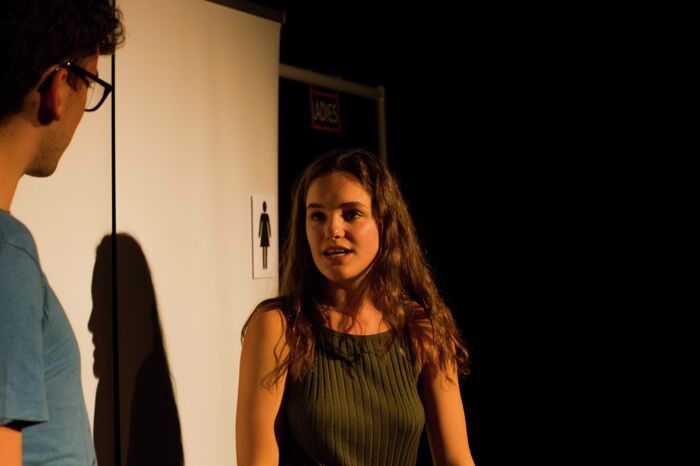Grave Concern is a dark comedy, which isn’t quite dark or comic enough
Despite a re-worked script, Grave Concern still failed to hit the mark at the Fringe, writes Maria Cleasby

Poised between the humour of a dysfunctional but loveable Belfast family and the grotesque realities of mortality, this “morbid farce” presents an engaging, if slightly clumsy, look at the comedy of life and death. The play follows a small-town family in Northern Ireland as they bicker over which of the ailing members will occupy the two remaining graves in the family plot. The story flits between the depressingly realistic and the outright absurd as we navigate the lives of these vibrant personalities and yet, while it might be considered to fulfil the role of a black comedy, Grave Concern is neither black nor comic enough to warrant a truly great production.
The play opens with a funeral, but it is immediately obvious that no reverence will be held for the dead, with two members of the congregation pulling out their phones to arrange a hook-up and an Indian takeaway respectively. It’s a wonderful opening full of droll one-sided dialogue and comedic tropes played out to great effect. This quality of writing continues throughout. Particular comedic highlights include the tea-towel beating that 20-year-old Joe (Paul Storrs) receives from his mother and uncle for breaking up with a girl by email, and the heated argument between married couple Brendan (Rory Russell) and Máiréad (Olivia O’Connor) over the best grave-finding website.
The failure of the direction to work with the pace of the script undermines the impact of comedic moments
However, the writing is frustratingly undermined by a series of lengthy and largely unnecessary scene changes. Although partially rescued by a fantastic soundtrack, designed by Jacob Baldwin, these set changes are not only annoyingly long, but they also interrupt the slick flow of the play. Connor Rowlett’s script is a fast-paced, unfiltered, stream of consciousness with voices constantly overlapping, yet the direction, by both Rowlett and Iulia Teodorescu, seems to be in conflict with the tempo of the play. Several of the actors seem uncomfortable with their own words, taking far too much time to consider their next sentence thus letting the pace drop. Perhaps this is due to struggles with unfamiliar accent, but it is a shame the rhythms that are so clearly meant to be present in the writing rarely appear in their fully-fledged form. The failure of the direction to work with the pace of the script, alongside dire scene changes, undermines the impact of some comedic moments and contributed to an overall sluggish feel.
The lethargy of the piece may not be due entirely to the delivery; the plot itself is also a little lacking. The main conflict, the competition over the two remaining plots in the family grave, is barely focussed on at all. There is no obvious antagonist or even protagonist and while there is certainly an affecting emotional climax, the lack of appropriate build up or resolution is a little dissatisfying. Instead, I felt I was just sitting through a series of admittedly very funny but largely unrelated scenes. Some of the major climactic moments are practically brushed over. The script has been cut down from its original production and so perhaps the discordant nature of the plot is due to an editing error and something has been lost along the way.
That being said, there is some superb acting that saves the confused plot. Harry Burke dominates the room as the self-assured yet dark-edged Uncle John. His clever one-liners and playful teasing of his Nephew (Storrs) are subtly undercut by a sense of exhaustion and grief, a man who has been through too much to still hold a positive view on life. The relationship between Burke and Storrs gives life to some of the funniest and indeed most poignant moments of the show. It is notable however that while Uncle John uses a wheelchair, Burke does not, indicating the discomfiting tendency towards having able-bodied actors filling disabled roles.
Russell and O’Connor also have their moments of old-married-couple comedy, although their devotion to each other isn’t entirely convincing. At times both of them, as well as the elderly Malachy (Daniel Quigley), drift into the realms of not-quite-comic-enough relief. Regardless, the family members work wonderfully together, producing a gut-wrenching moment that brought me close to tears. An impressive feat when I’d been chuckling away not two minutes earlier.
The snappy dialogue and hilarious personalities of Grave Concern undoubtedly make for a wonderful evening of comedy. It certainly has its fair share of belly laughs and stabs of pathos. However, if the piece is to be taken further, Rowlett needs to figure out exactly what, and indeed who, this play is really about.
 News / Cambridge academics stand out in King’s 2026 Honours List2 January 2026
News / Cambridge academics stand out in King’s 2026 Honours List2 January 2026 Interviews / You don’t need to peak at Cambridge, says Robin Harding31 December 2025
Interviews / You don’t need to peak at Cambridge, says Robin Harding31 December 2025 News / AstraZeneca sues for £32 million over faulty construction at Cambridge Campus31 December 2025
News / AstraZeneca sues for £32 million over faulty construction at Cambridge Campus31 December 2025 News / News in Brief: Maypole mentions, makeovers, and moving exhibits4 January 2026
News / News in Brief: Maypole mentions, makeovers, and moving exhibits4 January 2026 Features / “It’s a momentary expression of rage”: reforming democracy from Cambridge4 January 2026
Features / “It’s a momentary expression of rage”: reforming democracy from Cambridge4 January 2026










